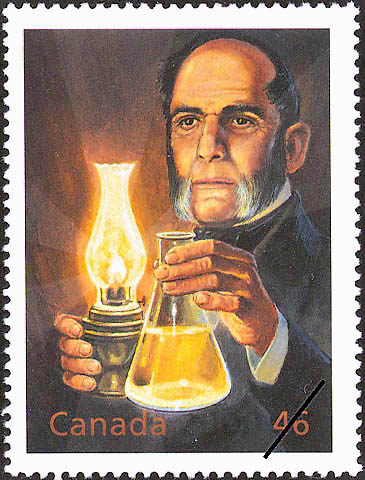On today’s date in 1855, Halifax inventor Abraham Gesner was awarded U.S. patents for his kerosene distillation process, “essentially duplicating what the Mesopotamians had discovered 1,200 years earlier,” according to author Alastair Sweeny.
Kerosene would soon replace whale oil as the fuel that lit the world.
Gesner and a group of investors formed the “highly successful” North American Kerosene Gas Light Company to market the new lamp fuel, according to Sweeny’s 2010 book, Black Bonanza: Canada’s Oil Sands and the Race to Secure North America’s Energy Future.
“Forty years later, after discoveries of crude oil in Ontario and Pennsylvania, John D. Rockefeller’s Standard Oil Company ended up controlling most of the lamp oil industry.”
Gesner’s North American Kerosene Gas Light Company was granted patent #12,612 on March 27, 1855, according to the U.S. Patent Office Annual Report of the Commissioner of Patents, Volume 1.
“The raw material is submitted to dry distillation at the lowest temperature at which the kerosene will volatilize. The liquid products of this distillation are heavy tar and water, or ammoniacal liquor, which lie at the bottom of the receiver, and a lighter liquid which floats above them. The light liquid is then drawn off and re-distilled at the lowest possible heat, whereby again a heavy and a light volatile liquid are produced. This light liquid is removed and mixed with from five to ten per cent of strong sulphuric, nitric, or muriatic acid; also, with from one to three per cent of peroxyd on manganese. Then the mixture stands from twelve to twenty-four hours, to let the impurities subside,” reads the 1855 report.
“The light liquid is then taken off and mixed with about two per cent (by weight) of powdered and freshly calcined lime, which will absorb the water. The mixture is now again distilled, raising the heat gradually to 160° Fahrenheit, until all the vapor has passed into the receiver that the liquid will yield at this temperature. This distillate is the ‘A Kerosene.’ By raising the heat now to 260°, ‘B Kerosene’ is produced; and by finally raising the heat to 360°, ‘C Kerosene’ will be produced, thereby completing the process.”
CANADA POST KEROSENE STAMPS
In 2000, Canada Post featured Gesner on a 46-cent commemorative stamp (Scott #1832b) as part of its Millennium Collection.
Designed by Steven Slipp, the stamp features a portrait of Gesner by David Preston-Smith. The 36-millimetre-by-48-millimetre stamp was printed by Ashton-Potter on Tullis Russell Coatings paper and recognized Gesner as the founder of the oil industry.
More than a decade earlier, in 1988, Canada Post featured Gesner’s invention on a 37-cent stamp (SC #1206) also printed by Ashton-Potter—this time on Slater paper. Designed by Roger Hill, the stamp depicts a kerosene lamp laid over a blueprint design.

The release of another oil stamp in 1958 coincided with the World Power Conference held in Montreal, Que., which hosted to about 1,700 delegates from 52 countries.
Even earlier, in 1958, Canada’s Post Office Department (as it was known before 1981) honoured the 100th anniversary of the Canadian oil industry with a five-cent stamp (SC #381). Designed by Alan Pollock (and with picture and letter engraving by Donald Mitchell), the stamp depicts a stylized portion of an oil refinery printed in red within a drop of oil. To its left is another drop enclosing a kerosene lamp that was popular during the previous century.
Two years after Gesner’s discovery, Hamilton businessman James Miller Williams brought North America’s first commercially successful oil well into production after seeing oil on the surface of a swamp near Oil Springs, about 30 kilometres southeast of Sarnia, Ont. These discoveries became the basis for the modern international petroleum industry.
Gesner died in Nova Scotia in April 1864. He was 66.


